
As graduating loomed closer and closer, my classmates and I took part in a simulated interview exercise to aid us in preparing to enter professional employment. I chose to be interviewed for a videographer and editor role in a company called Panoptic Group which is a content production company that creates promotional videos for brands. Becoming a videographer is not necessarily my dream job but I felt that the role encapsulated cinematography, editing and creative thinking which I have experience in and would be a solid starting point, especially considering I am not yet set on a specific career path.
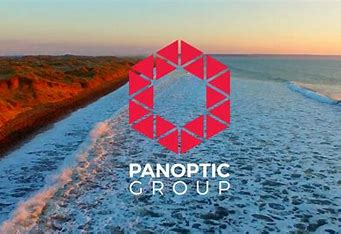
I also chose this role as I have edited a few of my student films and had some professional experience filming and editing media content during my placement at Rendr.
I will reflect upon my simulated interview using the Borton model (1970) as I believe this model is a fluid and simplistic process whilst still allowing one to reflect in an intellectual, rational, and cognitive manner.
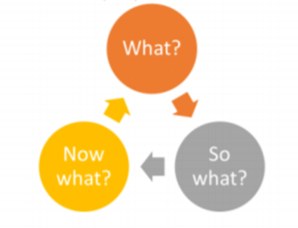
Preparation
Interviews are daunting and I knew I had to enage with the dreaded performance art of selling myself. In order to overcome my uncomfortability, I organised my answers to potential interview questions after reading ‘Brilliant Interview’. Jay asserts that ‘the interviewer is likely to ask you a few questions about what you know of their company ‘as it shows ‘enthusiasm, interest and effort’ (2011, p.21).

Following this advice, I frantically researched Panoptic Group, looking at their website and socials to learn more about their previous work and company ethos which I had concurred was “young talent” with a “relaxed and fun attitude”. “Sounds great!” I thought. After carrying out this research I felt much more secure about my interview as I could produce more focused answers and mention my skills that match their values, whilst demonstrating how passionate I am about working for them through exhibiting my vast knowdlegde of their company.
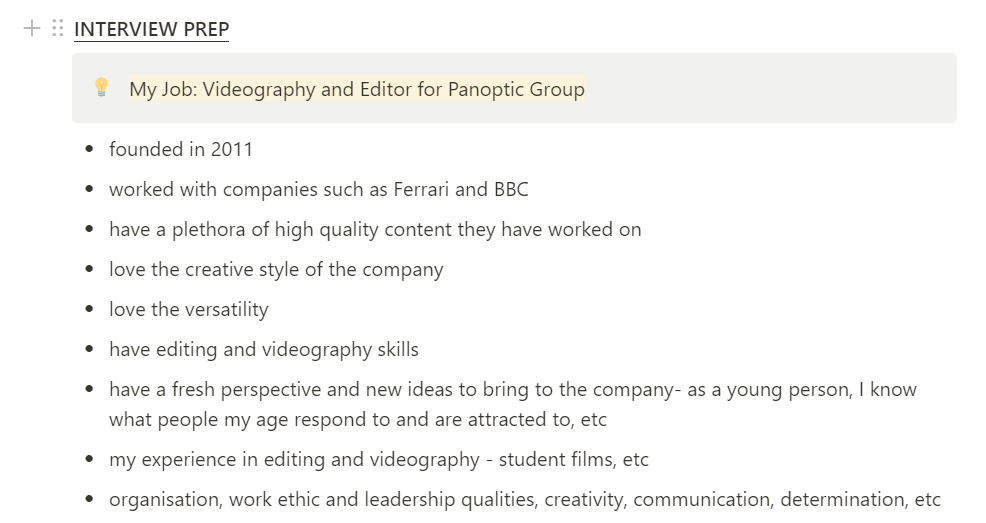
The next step was thinking of possible questions that I might be asked and carefully constructing answers that addressed each aspect. By doing so, I could emphasise my relevant skills and experience, tailoring my answers to the company and their focus on producing engaging, unique content. My thought process was that by rehearsing answers I would be able to approach any questions with confidence, and relate everything back to the company and the job, trying to flatter the employer and secure the role! I approached this as if I was an actor learning lines. In my mind, I had everything covered. I would soon learn of my naivety.
The Interview
Walking into any interview fills me with a rush of anxiety and nerves. Being interviewed by my peers somehow made me more uneasy as I knew these people, and felt like they could see through me. This was also my first-time interviewing someone else which made me slightly uncomfortable, thinking;
“Who am I to be asking these questions? They probably know more than me!”
I felt intimidated. However having been successful in many prior interviews and knwoing how much I had prepared, I deemed myself ready. Thus my nerves subsided.

Attempting to have a professional guise, I moved forward with asking my peers questions, feeling unbelievably lucky that I was not the first to be interviewed.
Becoming the interviewer was a drastic shift in the dynamics that I am used to, always taking on the inverse role. I attempted to ask thought provoking questions that gave the others an opportunity to reference their experience and skills, by doing so I believe I performed well as an interviewer, but that was the easy part. It eventually came around to my interview. I tried to focus and remember the answers I had prepared which concerned my key skills, experience, and what I can bring to the company whilst giving examples through stories of past experiences as Kennedy (2012) suggests that when answering a question, the interviewee should outline a situation, ‘the skills used in your action to deal with it, and the successful results’ in order to give a full bodied answer.
My nerves began to rise, and I noticed sweat forming on my palms as I was asked an unexpected question;
“Where do you see yourself in five years?”
Suddenly my confidence left me and I felt trapped, noticing the intimidating galres of my peers as they awaited my response.
This is an extremely daunting concept to think about yet alone answer in a professional manner. I did the best I could, attempting to sound passionate and proficient. With a shaky voice I explained how I wish to be in a higher position within the company and have achieved many of my creative goals.
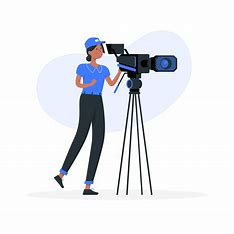
My other answers felt quite natural, but this one felt very forced. I was under pressure to deliver something impressive as this was my last question and the final note of my interview. After trying to make sense of my scrambled thoughts and putting them into words I produced an answer. My response was vague and bland, feeling quite robotic and honetly, lacking truth. I took a deep breath in and before I could register what nonsense I had spewed out, my interview ended.
Insights

This experience was my first time formally interviewing for a job in the film and media industry. It gave me an opportunity to practice talking about my skills and experience in the industry that I usually don’t bring up in interviews for part time work, etc. Additionally, this process gave me a valuable insight into what applying for a professional job in film would involve, helping me to understand what type of questions would be asked and the responses required of me.
For example, when I was presented with a question concerning my creative skills, I was forced to think about my knowledge and skillset that relates directly to the creative industries, and this job specifically, as well as figuring out a way to link transferrable skills that I have required from other jobs to this videographer role. Answering my interview questions allowed me to wade out any insignificant information about myself and my experience, identifying the key areas that should be highlighted in a film industry interview. I am now able to focus on developing my thoughts within these areas such as my technical skills and passion to work in the industry, inspired by Borton’s model.
Before this interview, I severely underestimated my skills and knowledge within film and media, thinking that I could never compete with my peers and am lacking in so many areas. The feeling of “everyone else is ahead of me” surprisingly left as I heard myself listing my plethora of experience.
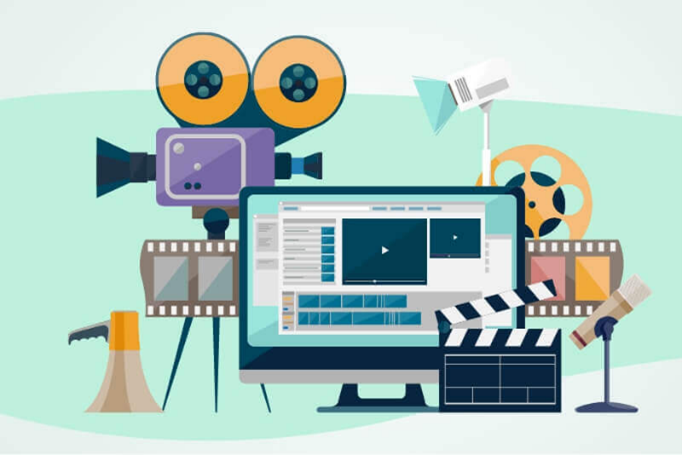
I realised my accomplishments and experinces are quite impressive and have equipped me with various significant skills, extremely useful for the job I was interviewing for and in the industry in general. I also found that using assertive language was a way to sell myself and display confidence.
‘Words like “best,” “always” and “most” give your spokesperson an air of authority on the subject’ (2022, pp.1)
“Interview Tip.” Nonprofit communications report vol. 20: 1–1. Web.
This highlights to the employers that I am confident in my abilities and am sure of the value I could bring to their company. Learning from the answers of my peers is the most significant thing I took away from this process. Listening to their experiences and their approach to answering questions such as the tone and language they used, along with the key skills they mentioned gave me ideas for my own answers. Seeing the interview from both sides equipped me with important interview skills. Acting as the interviewer allowed me to understand what the interviewer is looking for, the knowledge and experience that stand out, and what sounds impressive.
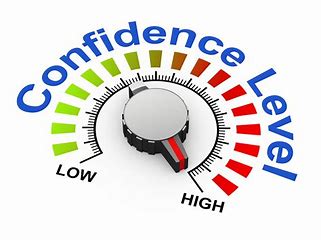
Future Learnings
Overall, I felt that my simulated interview was very successful. The positive feedback from my peers not only bolstered my confidence but also provided invaluable insights into refining my interview approach and improving my responses, tackling questions with ease and poise.
My interview flaws were also highlighted to me. I realized the importance of thorough preparation beyond merely researching the company as I lacked knowledge of the job when answering questions. This sudden awareness of my faults in preparation felt like a wave of anxiety ready to crash over my confidence, however I tried to follow Hudgson’s guidance:
‘I Remember the advice of Henry Ford: that every failure is simply an opportunity to begin again, but this time with more intelligence’. (2015)

Analysing the job description in-depth and tailoring my answers accordingly emerged as a key takeaway, which I intend to incorporate into my future interview preparations. Furthermore, I gleaned the significance of articulating the skills and knowledge gained from my experiences, demonstrating my ability to engage in reflective thinking and grasp the ‘big picture’ ideology even in pressing circumstances.
Due to this process I have learned that displaying how I don’t focus on the negatives is a desirable quality, through taking on the position of the interviewer I found that I felt myself trusting this person because of their rational and optimistic responses when posed with questions such as;
“How would you deal with an unhappy client?”
This was an extremely valuable lesson.

Moreover, I noticed that when my peers spoke with a modest confidence, they came across well and caused me to hang onto their every word. Therefore, I will now have more confidence when speaking about my abilities without the worry of sounding like a cocky know-it-all, using assertive language to express my knowledge and capabilities.
Armed with this newfound awareness, I am ready to approach future interviews as I have a comprehensive understanding of what is expected in a creative industry interview. Drawing upon the lessons learned from this unique experience of interviewing peers, I now know what answers perform best and that embracing a friendly demeanour coupled with an aura of self-assurance and confidence emerged as the winning formula to captivate prospective employers. I am eager to put these lessons into practice as I advance in my career journey.
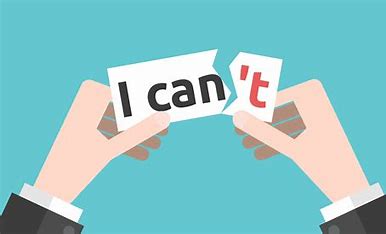
Bibliography
Hodgson, S. (2015) Brilliant Answers to Tough Interview Questions. Fifth edition. Harlow, England: Pearson, [Online]. Available at: https://learning.oreilly.com/library/view/brilliant-answers-to/9781292015330/?sso_link=yes&sso_link_from=queens-university-belfast (Accessed on: 3rd March 2024)
Jay, R. (2011) Brilliant Interview: What Employers Want to Hear and How to Say It. 3rd ed. Harlow: Pearson [Online]. Availale at: https://learning.oreilly.com/library/view/brilliant-interview-3rd/9780273743934/?sso_link=yes&sso_link_from=queens-university-belfast (Accessed on: 1st March 2024)
Kennedy, J. (2012) Job Interviews for Dummies. 4th ed. Hoboken, N.J: John Wiley & Sons, Inc., [Online]. Available at: https://learning.oreilly.com/library/view/job-interviews-for/9781118112908/?sso_link=yes&sso_link_from=queens-university-belfast (Accessed on: 3rd March 2024)
Wiley, P. (2022) “Interview Tip.” Nonprofit communications report vol. 20: 1–1. Web. pp. [Online]. Avialable at: https://onlinelibrary-wiley-com.queens.ezp1.qub.ac.uk/doi/full/10.1002/npcr.31975 (Accessed on: 5th March 2024)
Other Links
Panoptic Group:
Job Post:
https://uk.indeed.com/m/viewjob?jk=0d74d7a21cb53a57&from=comp-individual-job
Borton Model:
https://www.researchgate.net/figure/Bortons-1970-Reflection-Model-Retrieved-from_fig17_329573841